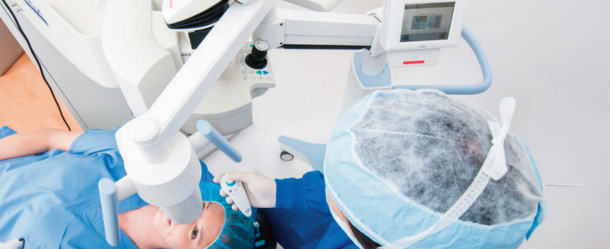Anita Miedziak, M.D. of the Princeton Eye Group in Princeton has conducted years of clinical research trials to study the effectiveness of an innovative treatment to stop or slow the progression of Keratoconus and Corneal Ectasia. Dr. Miedziak is one, of only two, principal investigators in FDA cross-linking trials in New Jersey. She has vast experience in arresting the progression of Keratoconus and Corneal Ectasia and is now the only ophthalmologist in this area performing the procedure.
Princeton Eye Group has acquired the KXL by Avedro Inc. – the only FDA approved cross-linking system in the USA – and is the only area provider to offer this technology. For more information or to schedule an appointment with Dr. Miedziak, please call 609-924-9200.
What is Keratoconus?
Keratoconus is a non-inflammatory eye condition in which the cornea progressively thins and weakens, altering its round dome shape to a cone-like bulge which can result in significant visual impairment.
What is Corneal Ectasia?
The term Corneal Ectasia refers to a group of conditions, including Keratoconus. In some cases, Corneal Ectasia can occur after a patient has undergone refractive surgery (LASIK or PRK), where irregular astigmatism has developed. In both instances, visual impairment can increase as the cornea continues to bulge.
Symptoms
Individuals in their late teens or early twenties may experience the first signs of Keratoconus. The condition may progress for 10-20 years before stabilizing or slowing down. Each eye may be affected differently. In the early stages of Keratoconus, people might experience:
- Glare
- Distortion of vision
- Ghost images
What is Cross-Linking?
Corneal collagen cross-linking is a medical procedure that combines the use of ultra-violet (UV) light and riboflavin (vitamin B2) eye drops. Corneal cross-linking:
- Arrests progressive stretching of the corneal collagen
- Creates new corneal collagen cross-links
- Results in a shortening and thickening of the collagen fibrils
- Leads to the stiffening of the cornea
For more information on Collagen Cross-Linking using Avedro KXL system, please visit our Services page.


